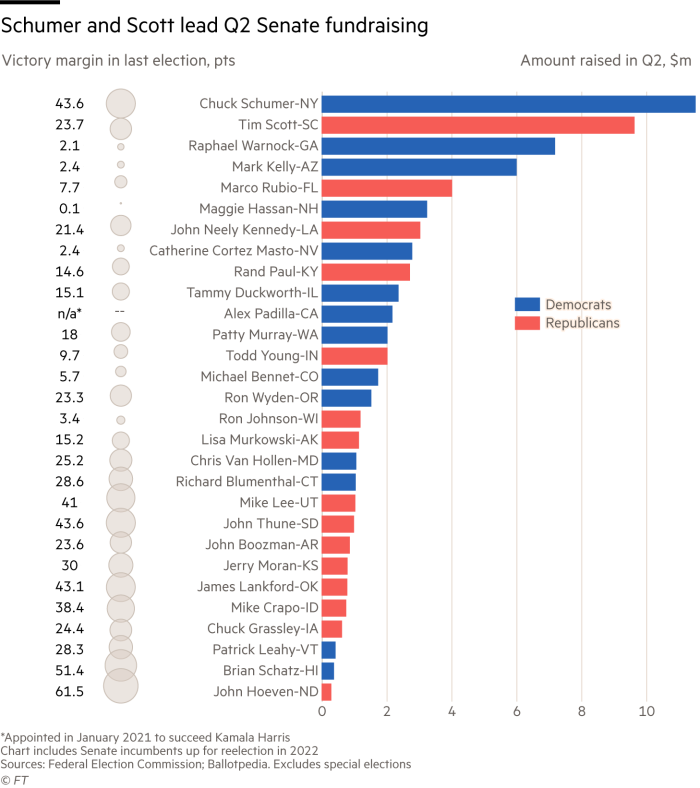[ad_1]
The fundraising arm for House Republicans significantly outraised its Democratic counterpart in the second quarter, revealing how a fractured GOP has been able to bring in huge sums ahead of next year’s midterm elections.
Data from the National Republican Congressional Committee, a fundraising vehicle that works to elect Republicans to the lower chamber of Congress, showed the NRCC brought in more than $45.5m in the second quarter, including more than $20m in June. Those figures were boosted by a $6.5m contribution from Kevin McCarthy and a $4.5m transfer from Steve Scalise, the number one and number two ranking House Republicans, respectively.
By comparison, the Democratic Congressional Campaign Committee, which recruits and funds Democratic House candidates, raised $36.5m in the second quarter, and almost $14.4m in June. The parties’ house committees released fundraising figures prior to the filing deadline of July 20.
“Republicans would be expected to do well if trends hold up,â€Â said Brendan Glavin, a senior data analyst at OpenSecrets, a non-partisan research group.
History favoured the party out of power in congressional elections after the first two years of the presidency, Mr Glavin said. He added that Republicans’ large fundraising hauls indicated “a combination of optimism for next year and the fact that the Democratic majority is very narrowâ€Â due to Democratic losses in 2020.
Republicans have been able to flex their fundraising muscles in recent months even after Donald Trump left office and exposed huge fissures in the party over its future. Separate disclosures showed the Republican National Committee outraised the Democratic National Committee in May, bringing in $70.4m compared to the DNC’s $68.7m.
Congressional Republicans are split over whether to continue to back the former president. Trump has been banned from most social media platforms over allegations he encouraged the January 6 Capitol riots and his continued false claim that the election was “stolen†from him. Some Republicans want to pursue a more moderate path ahead of next year’s midterms, when control of both the House and the Senate will be up for grabs. Trump has not ruled out running again for president in 2024.
Many Republicans fretted that their fundraising dollars would dry up in the wake of January 6, after several large US companies withdrew donations to those in the party who voted against certifying the election of Joe Biden.
But the latest Federal Election Commission filings from congressional candidates show the GOP has continued to pile up cash as next year’s midterms approach.
While Trump lost the White House in November’s elections, Republicans made gains in the House, narrowing the Democrats’ majority. And though Democrats now control the Senate, the balance of power in the upper chamber is precarious: the 100-member body is split, 50-50, between Democrats and Republicans, with vice-president Kamala Harris able to cast a tiebreaking vote.
The National Republican Senatorial Committee, which works to elect Republicans to the Senate, said it raised $28m in the second quarter, and $10.5m in June. The Democratic counterpart, the Democratic Senatorial Campaign Committee, has yet to disclose its fundraising figures for the second quarter.

Trump, who recently re-emerged on the national political stage with campaign-style rallies in Ohio and Florida and an appearance in Texas at CPAC, the conservative conference, has endorsed a number of congressional candidates in races across the country. The latest figures, however, offer a mixed picture of the value of a Trump endorsement.
Tim Scott, the Republican senator from South Carolina who has built a national brand in part through his efforts to spearhead bipartisan police reform negotiations, was endorsed by Trump in March.
Scott raised $9.6m in the second quarter, on top of $2.1m in the first quarter, according to FEC filings. That makes Scott — who was re-elected in 2016 with more than 60 per cent of the vote — the second most successful Senate fundraiser in the second quarter. He is behind only Chuck Schumer, the Senate’s top Democrat and a formidable fundraiser with a record of funnelling his cash to other Democratic candidates.
Meanwhile, Lisa Murkowski, a centrist Republican senator from Alaska who sometimes votes with the Democrats, will next year face a primary challenge from fellow Republican Kelly Tshibaka, who Trump endorsed last month. The former president said Murkowski — one of seven Senate Republicans who voted to convict him in an impeachment trial for his role in the January 6 riots — was “bad for Alaskaâ€.
But Murkowski raised $1.1m in the second quarter, leaving her with $2.3m cash on hand. She brought in more than twice as much as Tshibaka, who raised just $544,000 over the same three-month period and ended the quarter with about $275,000 in the bank.
Murkowski’s haul underscores a trend of a handful of vocal Republican Trump critics who have been able to raise large sums in recent months.
The FEC filings show Liz Cheney, the House Republican who was ousted from her leadership role over her opposition to the president, brought in nearly $2m in the second quarter, on top of $1.5m in the first quarter, leaving her with $2.8m cash on hand at the end of June.
Swamp Notes
Rana Foroohar and Edward Luce discuss the biggest themes at the intersection of money and power in US politics every Monday and Friday. Sign up for the newsletter here
[ad_2]
Source link






